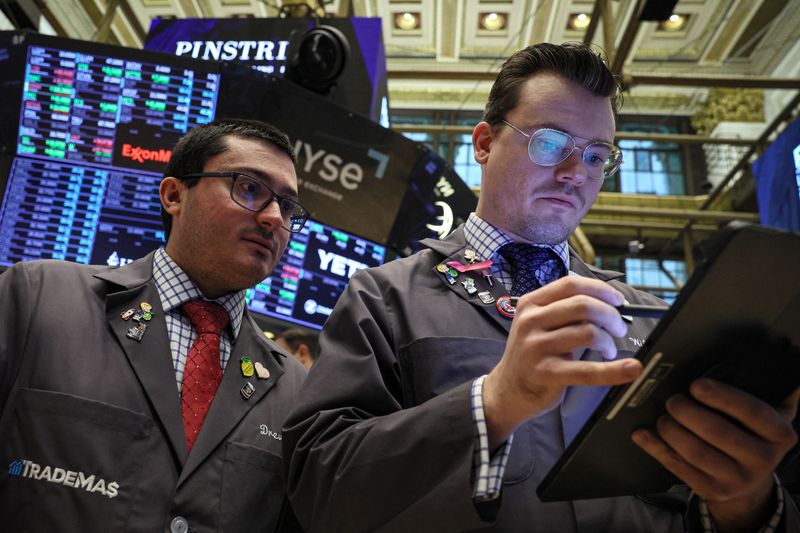By David Randall
NEW YORK (Reuters) -The U.S. stock market’s strong start to the year faces a major test next week in a stretch packed with big tech earnings, the Federal Reserve’s monetary policy meeting and the closely-watched employment report.
The S&P 500 is up nearly 3% since the end of December and stands near record highs, driven in part by expectations of a U.S. economic “soft-landing” in which growth remains stable while inflation cools.
A thicket of potentially market-moving events may test that optimism. Those include earnings from Alphabet (NASDAQ:GOOGL) and Microsoft (NASDAQ:MSFT) on Tuesday, the conclusion of the Federal Reserve meeting on Wednesday, and Apple (NASDAQ:AAPL) and Amazon (NASDAQ:AMZN) results on Thursday. Friday closes out the week with the nonfarm payrolls report and earnings from Meta Platforms (NASDAQ:META).
Through it all, “the market is going to be looking for confirmation that we're in a soft landing," said Jack Janasiewicz, lead portfolio strategist at Natixis Investment Managers Solutions. "As long as growth remains in the sweet spot here ... the market will keep grinding up."
Earnings will be a major focal point, with five of the massive “Magnificent Seven” growth and technology stocks that have powered markets higher for much of the last year reporting next week.
Collectively, the market capitalization of Alphabet, Microsoft, Apple, Amazon and Meta account for nearly 25% of the S&P 500, giving them an outsize influence on the performance of the broader index.
While most of the group has continued to rise in 2024, shares of electric-carmaker Tesla (NASDAQ:TSLA) are down more than 26% year-to-date, leaving it among the worst performers in the S&P 500 for the year so far. By the same token, chipmaker Nvidia (NASDAQ:NVDA) has ridden burgeoning excitement over artificial intelligence to a nearly 23% gain this year.
"There’s not this monolithic performance among those stocks anymore," said Liz Ann Sonders, chief investment strategist at Charles Schwab (NYSE:SCHW). "If there is a downside to earnings … that could take the bloom off the rose" for the market as a whole.
Companies in the S&P 500 are reporting earnings 4.2% above expectations, in line with the long-term average and below the average of 5.7% for the prior four quarters, according to LSEG data.
The Fed meeting and Fed Chairman Jerome Powell's subsequent press conference could also sway markets. Some investors now reassessing earlier expectations for rate cuts this year following strong economic data and statements from Fed officials that suggested that rate cuts may not be as aggressive as expected, said Tiffany Wade, senior portfolio manager at Columbia Threadneedle Investments.
Investors have pushed expectations for the Fed’s first cut of the cycle to May, from March. Markets are now pricing 135 basis points in cuts by the end of the year, down from over 160 basis points expected in December.
While the Fed is expected to leave rates unchanged next week, investors will be looking for signs of whether the central bank believes it has come far enough in its inflation fight to begin reducing borrowing costs sooner rather than later.
"The Fed commentary next week could create some risk of expectations for the first rate cut getting pushed out even further into the year, and that may be negative to where the market is priced right now," said Wade. "There is more confidence in the market that we are going to navigate through a soft landing. I’m still not totally convinced of that."
Markets will also be looking for signs that the Fed is planning on making changes to its quantitative tightening program, which has contributed to monetary policy tightening by sapping liquidity in the Treasury market.
Investors will also watch for word from the Treasury Department over its estimates for future funding and auction sizes, which will come on Monday and Wednesday. Concerns over Treasury supply due to deficit spending have helped lift bond yields. The 10-year Treasury has been hovering near its highest yield since mid-December.
At the end of the week, U.S. employment data might have to walk a fine line to satisfy investors. A sharp drop in employment could suggest that the 525 basis points of rate increases delivered by the Fed since 2022 are finally starting to bite, while stronger-than-expected hiring could bolster the case for the central bank to keep rates elevated in order to prevent an inflationary rebound.

As it stands, evidence of economic strength has surprised investors in recent weeks. U.S. growth came in stronger than expected in the fourth quarter, data showed earlier this week, as the economy shrugged off predictions of a recession by growing 2.5% in 2023.
Overall, next week is “the largest 'event-risk’ week ahead in recent memory," wrote Nomura strategist Charlie McElligott.